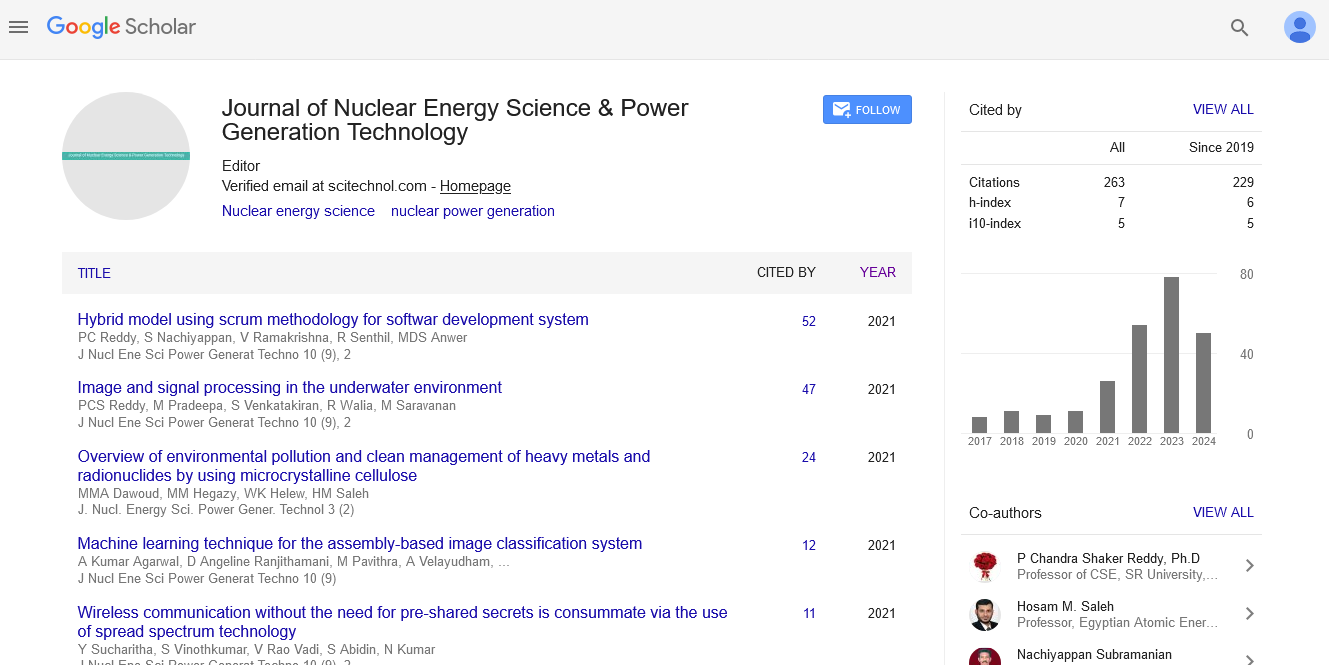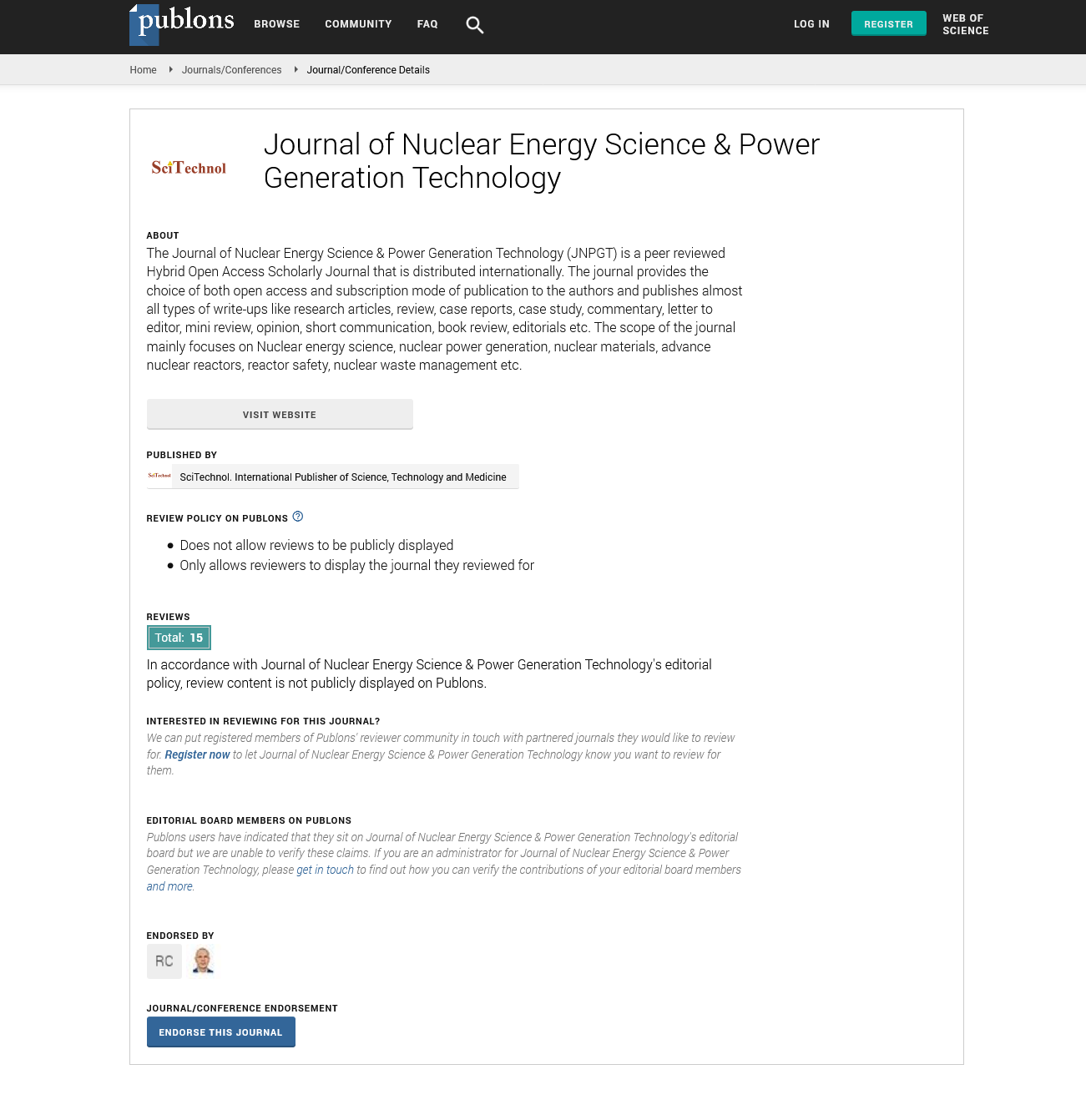Commentary, J Nucl Ene Sci Power Generat Technol Vol: 13 Issue: 1
Approaches for Ensuring Safety and Sustainability in Spent Fuel Management
Riwas Ramoke*
1Department of Nuclear Engineering, University of California, Berkeley, USA
*Corresponding Author: Riwas Ramoke,
Department of Nuclear Engineering,
University of California, Berkeley, USA
E-mail: riwas_ramoke@gmail.com
Received date: 23 December, 2023, Manuscript No. JNPGT-24-130435;
Editor assigned date: 26 December, 2023, PreQC No. JNPGT-24-130435 (PQ);
Reviewed date: 09 January, 2024, QC No. JNPGT-24-130435;
Revised date: 16 January, 2024, Manuscript No. JNPGT-24-130435 (R);
Published date: 23 January, 2024, DOI: 10.4172/2325-9809.1000372.
Citation: Ramoke R (2024) Approaches for Ensuring Safety and Sustainability in Spent Fuel Management. J Nucl Ene Sci Power Generat Technol 13:1.
Description
Nuclear energy stands as a basis in the global pursuit of sustainable and low-carbon energy sources. However, alongside its potential comes the challenge of managing the radioactive waste produced by nuclear power generation this challenge lies spent fuel management an important aspect of nuclear energy infrastructure that demands careful consideration and strategic planning to ensure both safety and sustainability. Spent fuel, a by-product of nuclear fission in power reactors, poses unique challenges due to its highly radioactive nature and long-term environmental impact. Effectively managing this waste stream requires comprehensive strategies that address storage, transportation, and eventual disposal. As nations grapple with these complexities, the need for robust spent fuel management practices becomes increasingly apparent.
Central to spent fuel management is the safe and secure storage of radioactive waste. Nuclear power plants typically store spent fuel onsite, either in pools of water or in dry cask storage systems. These interim storage solutions provide shielding and cooling to modify radiation hazards while the fuel undergoes radioactive decay. However, with storage capacities nearing their limits and concerns over long-term safety, the search for permanent disposal options intensifies. Geological repositories represent one approach to permanent disposal, where spent fuel is buried deep underground in stable geological formations. Countries like Finland, Sweden, and France have made significant progress in developing such repositories, recognizing the importance of isolating radioactive waste from the biosphere for millennia to come. Despite technical advancements, challenges persist, including regulatory hurdles and societal acceptance.
Reprocessing another avenue for spent fuel management, aiming to extract reusable materials from spent nuclear fuel. By chemically separating unused fuel components, reprocessing can recover valuable isotopes for reuse while reducing the volume and heat load of waste destined for disposal. However, reprocessing also presents proliferation risks and generates secondary waste streams, underscoring the need for careful consideration of its benefits and drawbacks. Emerging reactor technologies, such as fast reactors and molten salt reactors, provides additional possibilities for spent fuel management. These advanced designs potential greater efficiency in fuel utilization and the transmutation of long-lived radioactive isotopes into shorter-lived or stable elements. While still in the development stage, these technologies hold the potential to revolutionize spent fuel management and enhance the sustainability of nuclear energy.
Conclusion
Amidst these technological advancements, the importance of public engagement and transparency cannot be overstated. Building trust and confidence in spent fuel management practices requires open dialogue, informed decision-making, and meaningful stakeholder involvement. Addressing concerns over safety, environmental impact, and long-term stewardship is essential for fostering acceptance and support for nuclear energy development. Spent fuel management stands as a vital challenge in the pursuit of safe, reliable, and sustainable nuclear energy. By implementing comprehensive strategies that prioritize safety, environmental protection, and societal engagement, nations can navigate the complexities of radioactive waste management with confidence. As continue to harness the potential of nuclear energy to meet our energy needs, responsible spent fuel management remains a foundation of our journey towards a cleaner and more sustainable future.
 Spanish
Spanish  Chinese
Chinese  Russian
Russian  German
German  French
French  Japanese
Japanese  Portuguese
Portuguese  Hindi
Hindi 

